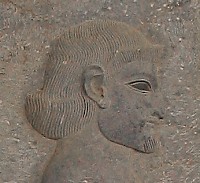Diodorus on the Nabataeans
In c.312 BCE, king Antigonus I Monophthalmus tried to subdue the Nabataeans. Several officers were involved, like Athenaeus, the king's son Demetrius, and Hieronymus of Cardia, a historian. His account of the events was excerpted by the Greek historian Diodorus of Sicily. Section 19.94.2-95.2 of his Library of World History, a description of the customs of the Nabataeans, is offered here in the translation by C.H. Oldfather.

For the sake of those who do not know, it will be useful to state in some detail the customs of these Arabs, by following which, it is believed, they preserve their liberty.
They live in the open air, claiming as native land a wilderness that has neither rivers nor abundant springs from which it is possible for a hostile army to obtain water. It is their custom neither to plant grain, set out any fruit-bearing tree, use wine, nor construct any house; and if anyone is found acting contrary to this, death is his penalty. They follow this custom because they believe that those who possess these things are, in order to retain the use of them, easily compelled by the powerful to do their bidding.
Some of them raise dromedaries, others sheep, pasturing them in the desert. While there are many Arab tribes who use the desert as pasture, the Nabataeans far surpass the others in wealth although they are not much more than ten thousand in number; for not a few of them are accustomed to bring down to the sea frankincense and myrrh and the most valuable kinds of spices, which they procure from those who convey them from what is called Arabia Eudaemon.
They are exceptionally fond of freedom; and, whenever a strong force of enemies comes near, they take refuge in the desert, using this as a fortress; for it lacks water and cannot be crossed by others, but to them alone, since they have prepared subterranean reservoirs lined with stucco, it furnishes safety. As the earth in some places is clayey and in others is of soft stone, they make great excavations in it, the mouths of which they make very small, but by constantly increasing the width as they dig deeper, they finally make them of such size that each side has a length of one plethrum. After filling these reservoirs with rain water, they close the openings, making them even with the rest of the ground, and they leave signs that are known to themselves but are unrecognizable by others. They water their cattle every other day, so that, if they flee through waterless places, they may not need a continuous supply of water.
They themselves use as food flesh and milk and those of the plants that grow from the ground which are suitable for this purpose; for among them there grow the pepper and plenty of the so-called wild honey from trees, which they drink mixed with water.
There are also other tribes of Arabs, some of whom even till the soil, mingling with the tribute-paying peoples, and have the same customs as the Syrians, except that they do not dwell in houses.
It appears that such are the customs of the Arabs. But when the time draws near for the national gathering at which those who dwell round about are accustomed to meet, some to sell goods and others to purchase things that are needful to them, they travel to this meeting, leaving on a certain rocknote their possessions and their old men, also their women and their children. This place is exceedingly strong but unwalled, and it is distant two days' journey from the settled country.